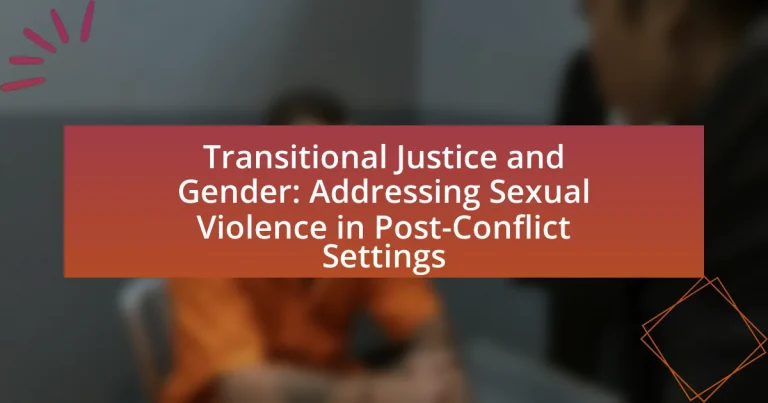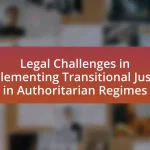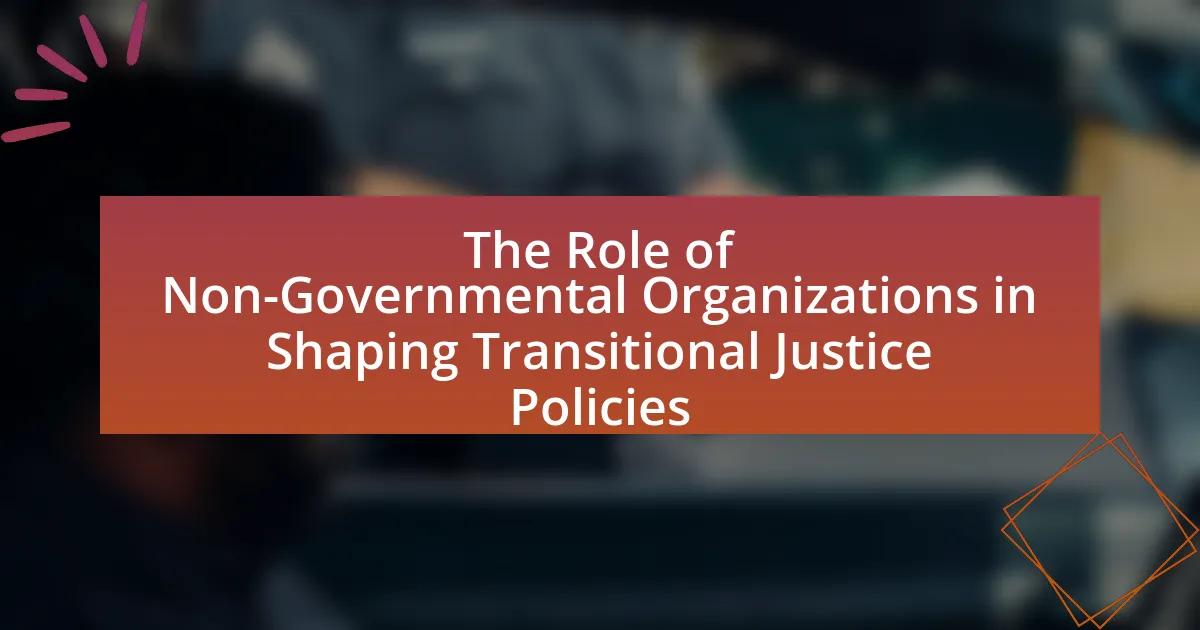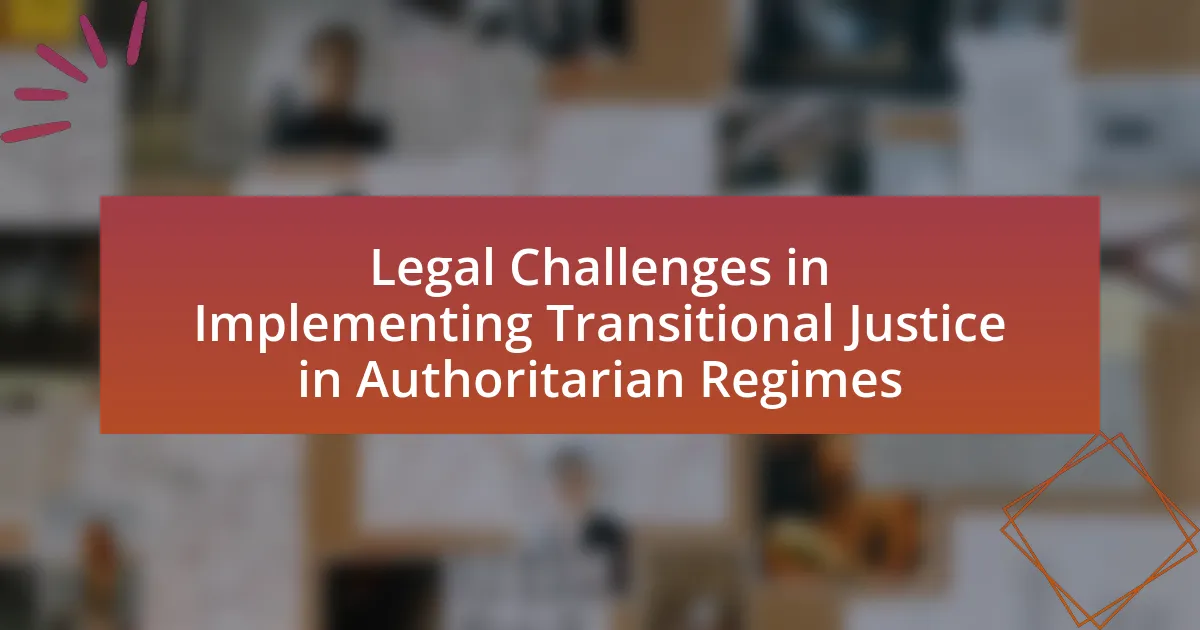Transitional justice refers to the measures implemented in post-conflict settings to address past human rights violations, with a specific focus on the unique experiences of women and marginalized genders regarding sexual violence. The article examines how transitional justice mechanisms, such as truth commissions and legal reforms, address gender-based violence and promote accountability, healing, and reconciliation. It highlights the importance of incorporating gender-sensitive approaches to ensure the voices of survivors are heard and systemic inequalities are addressed. Additionally, the article discusses the long-term impacts of sexual violence on individuals and communities, the challenges faced in achieving justice for survivors, and the role of advocacy groups in supporting gender-sensitive transitional justice initiatives.
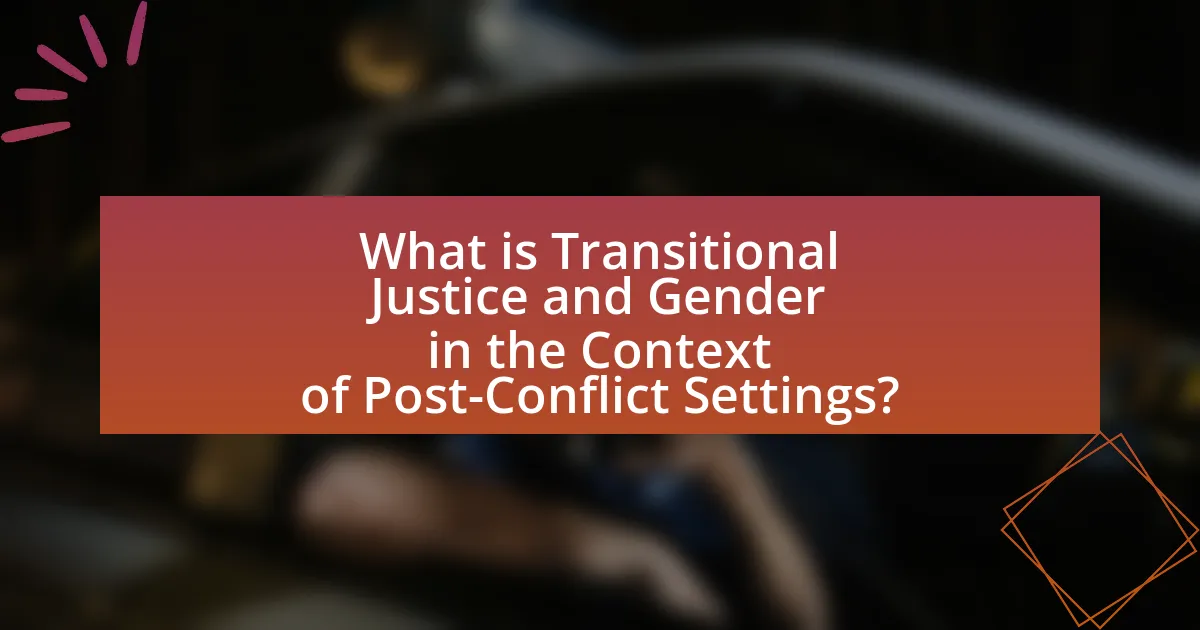
What is Transitional Justice and Gender in the Context of Post-Conflict Settings?
Transitional justice refers to the set of measures implemented in post-conflict settings to address past human rights violations and promote accountability, reconciliation, and healing. In the context of gender, transitional justice specifically focuses on addressing the unique experiences and needs of women and marginalized genders, particularly regarding sexual violence that often escalates during conflicts. Research indicates that women are disproportionately affected by sexual violence in war, with the United Nations reporting that sexual violence is used as a tactic of war in many conflicts. Effective transitional justice mechanisms must therefore incorporate gender-sensitive approaches to ensure that the voices of survivors are heard, justice is served, and systemic inequalities are addressed, thereby fostering a more inclusive and equitable society post-conflict.
How does Transitional Justice address issues of gender and sexual violence?
Transitional Justice addresses issues of gender and sexual violence by implementing mechanisms that acknowledge, investigate, and provide reparations for these crimes. These mechanisms include truth commissions, which document experiences of gender-based violence, and legal reforms that aim to hold perpetrators accountable. For instance, the International Criminal Court has prosecuted sexual violence as a war crime, emphasizing the need for justice in post-conflict settings. Additionally, reparative measures often include psychosocial support and economic assistance for survivors, recognizing the long-term impacts of such violence. Studies, such as those by the United Nations, highlight that addressing gender and sexual violence is crucial for achieving sustainable peace and reconciliation in societies recovering from conflict.
What are the key principles of Transitional Justice related to gender?
The key principles of Transitional Justice related to gender include recognition of gender-based violence, accountability for sexual violence, participation of women in decision-making processes, and the provision of reparations that address gender-specific harms. Recognition of gender-based violence is essential as it acknowledges the unique experiences of women and marginalized genders during conflicts, as evidenced by reports from organizations like the United Nations, which highlight that women are disproportionately affected by sexual violence in war. Accountability for sexual violence ensures that perpetrators are held responsible, which is crucial for justice and deterrence, supported by legal frameworks such as the International Criminal Court’s statutes. Participation of women in decision-making processes is vital for inclusive governance and reflects the need for diverse perspectives in peacebuilding, as shown in studies indicating that peace agreements are more durable when women are involved. Finally, reparations must address gender-specific harms to effectively support survivors, as outlined in the UN’s guidelines on reparations, which emphasize the importance of tailored approaches to meet the needs of women affected by conflict.
How does gender influence the experiences of victims in post-conflict settings?
Gender significantly influences the experiences of victims in post-conflict settings by shaping the nature of violence they face and their access to justice and support. Women often experience sexual violence as a weapon of war, leading to unique psychological and social repercussions, while men may face different forms of violence, such as forced recruitment or torture. Research indicates that women are disproportionately affected by sexual violence, with studies showing that up to 50% of women in conflict zones report experiencing such violence (UN Women, 2015). Additionally, gender norms can hinder women’s access to justice, as societal stigma and discrimination often prevent them from reporting crimes or seeking help. In contrast, men may face societal pressures that discourage them from expressing victimhood, complicating their recovery. Thus, understanding gender dynamics is crucial for effective transitional justice mechanisms that address the specific needs of all victims.
Why is addressing sexual violence critical in Transitional Justice?
Addressing sexual violence is critical in Transitional Justice because it acknowledges and seeks to rectify the profound harm inflicted on individuals and communities during conflict. This form of violence often serves as a tool of war, undermining social cohesion and perpetuating cycles of trauma. By addressing sexual violence, Transitional Justice mechanisms can promote accountability, provide redress to victims, and facilitate societal healing. For instance, the United Nations Security Council Resolution 1325 emphasizes the importance of addressing sexual violence in conflict and post-conflict situations, highlighting its role in achieving sustainable peace and security.
What are the long-term impacts of sexual violence on individuals and communities?
The long-term impacts of sexual violence on individuals include severe psychological trauma, such as post-traumatic stress disorder (PTSD), depression, and anxiety, which can persist for years after the incident. Research indicates that survivors often experience difficulties in forming relationships, maintaining employment, and engaging in daily activities, leading to a diminished quality of life. Communities also suffer long-term consequences, including social fragmentation, increased stigma, and a breakdown of trust among community members. Studies show that areas affected by sexual violence in conflict settings often face challenges in rebuilding social cohesion and economic stability, as the trauma experienced by individuals can hinder collective recovery efforts. For instance, a report by the World Health Organization highlights that communities with high rates of sexual violence often experience increased rates of violence and instability, further perpetuating cycles of trauma and disempowerment.
How does sexual violence affect the peacebuilding process?
Sexual violence significantly undermines the peacebuilding process by perpetuating cycles of trauma and distrust within communities. This form of violence not only inflicts physical and psychological harm on victims but also disrupts social cohesion, making reconciliation efforts more challenging. For instance, studies indicate that in post-conflict societies, such as those in the Democratic Republic of Congo, high rates of sexual violence correlate with increased community fragmentation and hindered trust in institutions. Furthermore, the stigma associated with sexual violence can prevent survivors from participating in peacebuilding initiatives, thereby excluding vital perspectives and contributions necessary for sustainable peace.
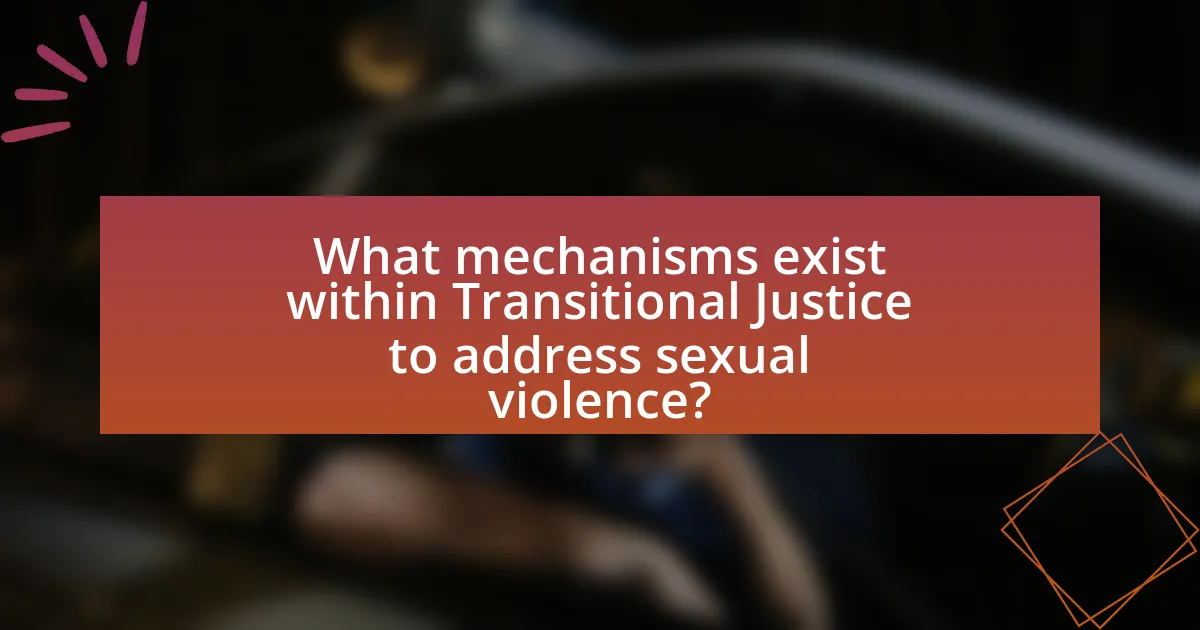
What mechanisms exist within Transitional Justice to address sexual violence?
Transitional Justice employs several mechanisms to address sexual violence, including truth commissions, reparations programs, and criminal prosecutions. Truth commissions investigate and document instances of sexual violence, providing a platform for survivors to share their experiences and ensuring accountability. Reparations programs offer financial and social support to victims, acknowledging their suffering and facilitating their reintegration into society. Criminal prosecutions, often through specialized courts or tribunals, hold perpetrators accountable, thereby reinforcing the rule of law and deterring future violence. These mechanisms collectively aim to promote healing, justice, and societal reconciliation in post-conflict settings.
How do truth commissions handle cases of sexual violence?
Truth commissions handle cases of sexual violence by documenting testimonies, acknowledging the experiences of survivors, and recommending reparations. These commissions aim to create a historical record of sexual violence, which is often overlooked in post-conflict societies, thereby validating the suffering of victims. For instance, the Truth and Reconciliation Commission in South Africa included sexual violence as a significant aspect of its investigations, leading to public acknowledgment and policy recommendations aimed at addressing these crimes. This approach not only seeks justice for victims but also promotes societal healing and accountability.
What are the challenges faced by truth commissions in addressing gender-based violence?
Truth commissions face significant challenges in addressing gender-based violence, primarily due to societal stigma, lack of adequate data, and insufficient legal frameworks. Societal stigma often prevents survivors from coming forward, as they may fear retribution or social ostracism, which hinders the commission’s ability to gather comprehensive testimonies. Additionally, the lack of adequate data on gender-based violence in conflict settings complicates the commission’s efforts to document and analyze these crimes effectively. Furthermore, many existing legal frameworks do not adequately recognize or address the specific nature of gender-based violence, limiting the commission’s capacity to provide justice and accountability. These challenges collectively impede the effectiveness of truth commissions in addressing gender-based violence in post-conflict settings.
How can truth commissions ensure the inclusion of women’s voices?
Truth commissions can ensure the inclusion of women’s voices by implementing gender-sensitive methodologies that prioritize women’s experiences and testimonies. These methodologies include establishing dedicated mechanisms for women’s participation, such as gender-balanced panels and outreach programs specifically targeting women. For instance, the Truth and Reconciliation Commission in South Africa included women’s testimonies by creating a separate women’s hearing, which allowed for a focused discussion on gender-based violence. Additionally, training commission staff on gender issues and the specific impacts of conflict on women can enhance understanding and sensitivity, leading to more inclusive processes. Research shows that when women’s voices are actively sought and integrated, the outcomes of truth commissions are more comprehensive and reflective of the societal fabric, thereby promoting a more equitable transitional justice process.
What role do courts and tribunals play in addressing sexual violence?
Courts and tribunals play a critical role in addressing sexual violence by providing a legal framework for the prosecution of offenders and ensuring justice for victims. They facilitate accountability through the enforcement of laws that criminalize sexual violence, thereby deterring future offenses. For instance, international tribunals, such as the International Criminal Tribunal for the former Yugoslavia, have established precedents by prosecuting sexual violence as a war crime, which has contributed to the recognition of such acts in international law. Furthermore, courts offer victims a platform to seek redress, which can include compensation and acknowledgment of their suffering, thus promoting healing and societal reconciliation in post-conflict settings.
What are the landmark cases that have shaped the legal framework for sexual violence in conflict?
Landmark cases that have shaped the legal framework for sexual violence in conflict include the International Criminal Tribunal for the former Yugoslavia (ICTY) case of Prosecutor v. Furundžija, which established that rape can constitute torture and a war crime. This case set a precedent by recognizing sexual violence as a serious violation of international humanitarian law. Another significant case is the International Criminal Court (ICC) case of Prosecutor v. Jean-Pierre Bemba Gombo, where the court affirmed that commanders can be held liable for sexual violence committed by their troops under their control, reinforcing the principle of command responsibility. Additionally, the case of Prosecutor v. Akayesu at the International Criminal Tribunal for Rwanda was pivotal as it was the first to define rape as a form of genocide, thereby expanding the understanding of sexual violence in the context of international law. These cases collectively contribute to the evolving legal standards addressing sexual violence in conflict situations.
How effective are international courts in prosecuting sexual violence crimes?
International courts have shown varying degrees of effectiveness in prosecuting sexual violence crimes, with notable successes and significant challenges. For instance, the International Criminal Tribunal for the former Yugoslavia (ICTY) successfully prosecuted several high-profile cases of sexual violence, establishing legal precedents that recognized rape as a war crime and a crime against humanity. However, the overall conviction rates for sexual violence crimes remain low, often due to difficulties in gathering evidence, societal stigma, and the complexities of proving consent in conflict situations. According to a study by the United Nations, only about 20% of sexual violence cases brought before international courts result in convictions, highlighting the systemic barriers that persist in achieving justice for victims.
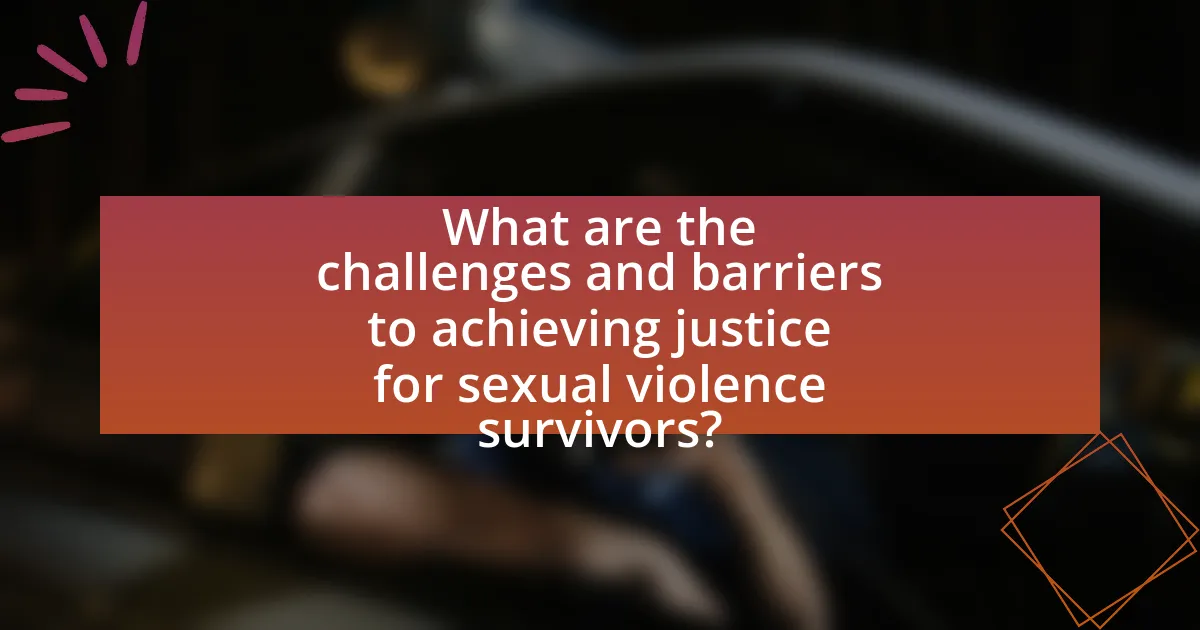
What are the challenges and barriers to achieving justice for sexual violence survivors?
Achieving justice for sexual violence survivors faces significant challenges and barriers, including societal stigma, inadequate legal frameworks, and lack of support services. Societal stigma often leads to victim-blaming, discouraging survivors from reporting incidents. In many jurisdictions, legal frameworks are insufficient, lacking specific provisions for sexual violence, which complicates prosecution efforts. Additionally, survivors frequently encounter a lack of access to psychological and legal support services, which can hinder their ability to navigate the justice system effectively. According to a report by the United Nations, only 10% of sexual violence cases result in a conviction, highlighting the systemic failures that contribute to these barriers.
What societal attitudes hinder the reporting and prosecution of sexual violence?
Societal attitudes that hinder the reporting and prosecution of sexual violence include victim-blaming, stigma surrounding survivors, and cultural norms that prioritize family honor over justice. Victim-blaming leads to survivors feeling responsible for the violence they experienced, discouraging them from coming forward. Stigma surrounding sexual violence often results in social ostracism, making survivors fear repercussions from their communities. Additionally, cultural norms that emphasize protecting family reputation can pressure survivors to remain silent, as reporting may be seen as bringing shame to their families. These attitudes create an environment where sexual violence is underreported and perpetrators are rarely held accountable.
How do stigma and shame affect survivors’ willingness to seek justice?
Stigma and shame significantly reduce survivors’ willingness to seek justice. Survivors often fear being blamed or ostracized by their communities, which can lead to feelings of isolation and reluctance to report incidents of sexual violence. Research indicates that societal stigma surrounding sexual violence can deter survivors from pursuing legal action due to concerns about their reputation and the potential for victim-blaming. For instance, a study published in the Journal of Interpersonal Violence found that survivors who perceived high levels of stigma were less likely to report their experiences to authorities, highlighting the detrimental impact of societal attitudes on their pursuit of justice.
What role does cultural context play in the perception of sexual violence?
Cultural context significantly influences the perception of sexual violence by shaping societal norms, beliefs, and attitudes towards gender and power dynamics. In various cultures, the understanding of consent, victim-blaming, and the stigma surrounding survivors can vary widely, affecting how incidents of sexual violence are reported and addressed. For instance, in some societies, traditional gender roles may lead to the normalization of violence against women, thereby minimizing the perceived severity of sexual violence. Research indicates that in post-conflict settings, cultural narratives can either perpetuate or challenge these norms, impacting the effectiveness of transitional justice mechanisms aimed at addressing sexual violence. Studies, such as those conducted by the United Nations and various NGOs, highlight that cultural sensitivity in legal frameworks and community engagement is crucial for fostering a supportive environment for survivors and ensuring accountability for perpetrators.
How can Transitional Justice frameworks be improved to better address gender issues?
Transitional Justice frameworks can be improved to better address gender issues by integrating gender-sensitive approaches throughout all stages of the process. This includes ensuring that women’s voices are represented in decision-making, implementing specific measures to address sexual violence, and providing reparations that consider the unique needs of women affected by conflict. Research indicates that women’s participation in peace processes leads to more sustainable outcomes; for instance, a study by the United Nations found that peace agreements are 35% more likely to last at least 15 years when women are involved. Additionally, incorporating gender analysis in truth commissions and legal frameworks can help uncover the specific impacts of conflict on women, thereby fostering accountability and justice.
What best practices can be implemented to enhance survivor support?
To enhance survivor support in post-conflict settings, implementing trauma-informed care is essential. Trauma-informed care recognizes the impact of trauma on individuals and integrates this understanding into all aspects of service delivery. This approach includes training staff to be sensitive to the needs of survivors, ensuring confidentiality, and creating a safe environment where survivors feel empowered to share their experiences. Research indicates that trauma-informed practices lead to improved outcomes for survivors, as they foster trust and facilitate healing. For instance, a study by the Substance Abuse and Mental Health Services Administration highlights that trauma-informed care can significantly reduce symptoms of PTSD and improve overall well-being among survivors.
How can community engagement improve the effectiveness of Transitional Justice initiatives?
Community engagement can significantly enhance the effectiveness of Transitional Justice initiatives by fostering trust and ensuring that the needs of affected populations are addressed. Engaging communities allows for the incorporation of local perspectives, which can lead to more culturally relevant and accepted justice mechanisms. For instance, research by the International Center for Transitional Justice highlights that when communities are involved in the design and implementation of justice processes, there is a higher likelihood of achieving reconciliation and restoring social cohesion. This involvement can also empower marginalized groups, including women, ensuring their voices are heard in addressing issues like sexual violence in post-conflict settings.
What practical steps can be taken to support survivors of sexual violence in post-conflict settings?
To support survivors of sexual violence in post-conflict settings, practical steps include establishing accessible healthcare services, providing psychological support, and ensuring legal protection. Accessible healthcare services are crucial for addressing physical injuries and sexually transmitted infections, as evidenced by the World Health Organization’s guidelines that emphasize the need for immediate medical care for survivors. Psychological support, such as counseling and trauma-informed care, is essential for mental health recovery, supported by studies indicating that survivors often experience long-term psychological effects. Legal protection involves creating frameworks that allow survivors to seek justice and hold perpetrators accountable, which is vital for restoring dignity and promoting societal healing, as highlighted in various transitional justice mechanisms.
What resources are available for survivors seeking justice and healing?
Survivors seeking justice and healing have access to various resources, including legal aid services, counseling and mental health support, and advocacy organizations. Legal aid services provide assistance in navigating the legal system, ensuring that survivors can pursue justice through courts or other legal avenues. Counseling and mental health support services offer emotional healing and coping strategies, which are crucial for recovery from trauma. Advocacy organizations, such as the International Rescue Committee and the United Nations Women, work to empower survivors, raise awareness about their rights, and provide resources tailored to their specific needs. These resources are essential in helping survivors reclaim their agency and seek redress for the violence they have experienced.
How can advocacy groups effectively support the implementation of gender-sensitive Transitional Justice?
Advocacy groups can effectively support the implementation of gender-sensitive Transitional Justice by actively engaging in policy formulation, raising awareness, and ensuring the inclusion of women’s voices in the transitional processes. These groups can influence legal frameworks by advocating for laws that specifically address gender-based violence and promote reparations for victims. For instance, the United Nations Security Council Resolution 1325 emphasizes the importance of women’s participation in peace and security processes, highlighting the need for advocacy groups to push for compliance with such international mandates. Additionally, by conducting research and documenting cases of sexual violence, advocacy groups can provide essential data that informs policymakers and helps shape gender-sensitive approaches in transitional justice mechanisms.
